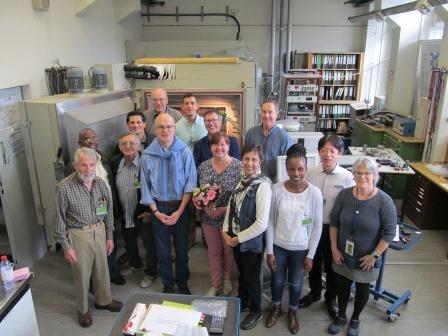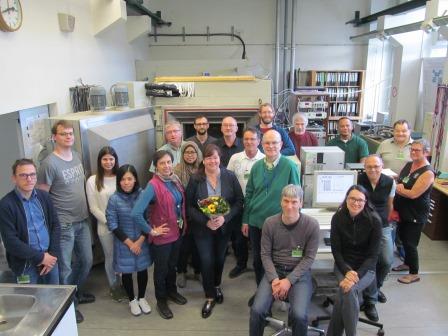Ozonesonde data are among the most popular observations in NDACC because the profiles are a mainstay of satellite calibration and are used to develop climatologies used in atmospheric chemical-climate models. Sonde data are used for analysis of lower stratospheric ozone trends, where satellites alone often do a poor job. However, the ozonesonde instrument that is used at ~100 stations worldwide shows biases at different stations and discontinuities in profile time-series due to a variety of measurement procedures. Thus, JOSIE (Jülich [Germany] Ozonesonde Intercomparison Experiment; Herman Smit, PI) and SHADOZ (Anne Thompson, PI), which are both celebrating 20 years, designed JOSIE-SHADOZ-2017. The campaign was held from 9 October through 3 November at the Forschungszentrum-Jülich (FZ-J) at the World Calibration Centre for Ozonesondes which Herman Smit (in center of photos) oversees. The photos show the participants from the first and second two-week campaigns, including the FZ-J support team during the second two-week campaign with the Environmental Simulation Chamber in the background. Faces familiar to the NDACC community included: Anne Thompson (SHADOZ PI and CoI of JOSIE-2017, René Stübi and Bryan Johnson (NDACC Sonde Working Group).
JOSIE-SHADOZ-2017 tested all the different instrument methods used at sonde stations with experimenters who are associated with the tropical SHADOZ (Southern Hemisphere Additional Ozonesondes network; https://tropo.gsfc.nasa.gov/shadoz). A unique feature of JOSIE-SHADOZ was that the ozonesondes were prepared by operators from organizations representing 8 SHADOZ sites: Nairobi, Irene, Réunion Island, Kuala Lumpur, Hanoi, Paramaribo, Costa Rica, Natal. Capacity-building activities during JOSIE-SHADOZ included lectures on sonde quality-assurance and training with coaches from sponsoring organizations, e.g., NASA/Wallops and GSFC (Greenbelt); NOAA/GMD; KNMI (Netherlands); Environment – Climate Change Canada; KMI (Belgium); Finnish Meteorological Institute. Financial support for the tropical operators came from the UNEP-sponsored Vienna Convention Trust Fund, administered by WMO. JOSIE-SHADOZ will be followed by a Workshop to be held in September 2018 with NDACC Sonde Working group participants. It is expected that JOSIE-SHADOZ will lead to new standards for sondes worldwide because all the instrument-solution combinations used by the larger community were represented at the 2017 JOSIE-SHADOZ.


Photo Credits: Forschungszentrum-Jülich, Germany